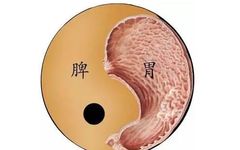Spleen and stomach Yang deficiency, also known as pi wei xu han (脾胃虚寒), is a type of deficiency cold syndrome caused by weakness of the spleen and stomach.
This condition is commonly seen in various chronic spleen and stomach diseases, such as chronic gastritis, gastrointestinal ulcers, and functional dyspepsia.
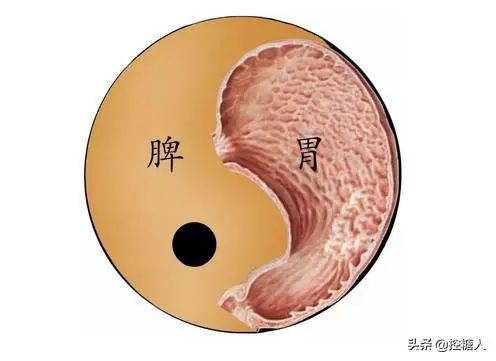
The spleen governs transportation and transformation, controls the muscles, and is responsible for ascending clear Qi, while the stomach is responsible for receiving and digesting food and fluids. If the spleen’s ability to transform essence is diminished and the stomach fails to descend properly, the body will exhibit various clinical manifestations in the gastrointestinal tract, complexion, tongue appearance, and more.
What Symptoms Are Associated with Spleen and Stomach Yang Deficiency?
When there is a deficiency of spleen and stomach Yang, a series of symptoms may appear:
-
As the stomach governs the reception and digestion of food, symptoms may include belching, poor appetite, reduced food intake, post-meal fullness, dull pain in the stomach area, preference for warmth and gentle pressure, and abdominal distension.
-
With the spleen’s role in transformation, a deficiency in spleen Yang may lead to symptoms such as a pale complexion, emaciation, dizziness, shortness of breath, and fatigue.
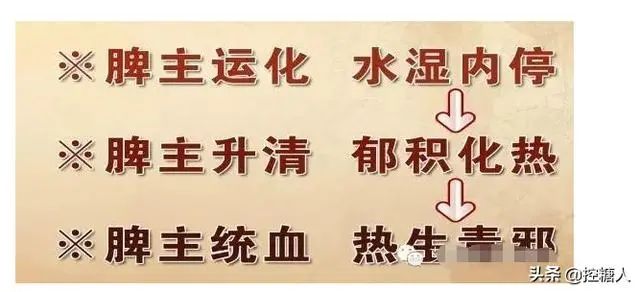
-
If the spleen cannot transform dampness, leading to stagnation of fluids in the body, symptoms may include edema, cough with phlegm, a heavy and fatigued body, lack of taste in food, and more.
-
When the spleen’s ability to ascend clear Qi is diminished, symptoms such as organ prolapse and diarrhea may occur.
-
With spleen and stomach Yang deficiency, the spleen’s ability to control blood may decline, leading to bleeding disorders such as hematochezia, epistaxis, and hematemesis.
-
Additionally, symptoms accompanying spleen and stomach Yang deficiency may include aversion to cold, cold extremities, clear water vomiting, a pale and swollen tongue with tooth marks, a white and greasy tongue coating, and a weak, deep pulse.
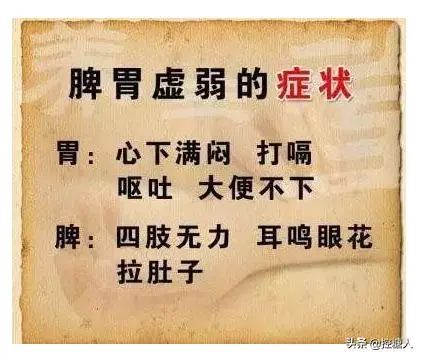
How to Regulate Spleen and Stomach Yang Deficiency?
In Traditional Chinese Medicine, the treatment for spleen and stomach Yang deficiency primarily focuses on warming the center and dispelling cold, with an emphasis on tonifying the spleen and stomach.
Patients with spleen Yang deficiency can regulate their condition through the following methods:
1. Dietary Recommendations: It is best to avoid cold, spicy, irritating, and greasy foods. The diet should be light, nutritious, and easy to digest:
-
Tea: Warm stomach teas such as brown sugar ginger tea can be consumed.
-
Foods: Regularly consume warming foods such as yam, leeks, brown sugar, red dates, longan, lamb, dog meat, nutmeg, cardamom, fennel, and dried ginger.
-
Fruits: Regularly eat warming fruits like durian, lychee, and longan.
2. Lifestyle Adjustments: Pay attention to keeping warm, especially in the stomach and abdominal areas. Dress warmly to prevent cold exposure, maintain a warm, well-ventilated, and dry living environment, and avoid damp and cold conditions. Engage in regular physical exercise to enhance physical fitness, maintain a regular sleep schedule, and avoid staying up late.
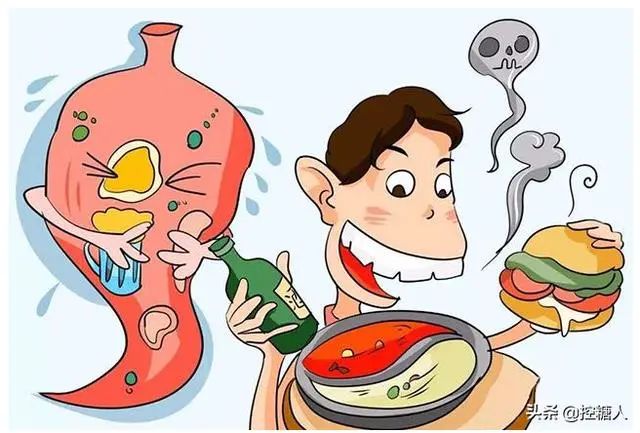
3. Acupoint Massage: Regularly massage acupoints such as Tianshu (天枢), Zu San Li (足三里), Tai Xi (太溪), Kun Lun (昆仑), and Zhong Wan (中脘) to promote the flow of Qi and blood in the stomach meridian. Moxibustion can also be applied to acupoints such as Guan Yuan (关元), Zhong Wan (中脘), Wei Shu (胃俞), Pi Shu (脾俞), and Zu San Li (足三里).
4. Herbal Treatment: Under the guidance of a physician, one can take traditional Chinese patent medicines such as Fu Zi Li Zhong Wan (附子理中丸), Rou Kou Si Shen Wan (肉蔻四神丸), Shen Ling Bai Zhu San (参苓白术散), and Ren Shen Gui Pi Wan (人参归脾丸) for regulation. Formulas such as Liujunzi Tang (六君子汤), Si Ni Tang (四逆汤), Xiao Jian Zhong Tang (小建中汤), Xiang Sha Liu Jun Zi Tang (香砂六君子汤), Huang Qi Jian Zhong Tang (黄芪建中汤), Bu Zhong Yi Qi Tang (补中益气汤), Li Zhong Tang (理中汤), and Fu Zi Li Zhong Tang (附子理中汤) can be used to warm and tonify the spleen and stomach, and dispel cold.
Conclusion:
Spleen and stomach Yang deficiency is a pathological term in Traditional Chinese Medicine, primarily diagnosed based on symptoms, complexion, tongue appearance, and pulse condition.
In cases of spleen and stomach Yang deficiency, there is insufficient Yang Qi and reduced transformation function, typically presenting symptoms such as dull pain in the stomach area, preference for warmth and gentle pressure, aversion to cold, cold extremities, abdominal distension, clear water vomiting, poor appetite, and loose stools.
Different individuals may exhibit variations in symptoms due to their constitution and other factors, necessitating tailored treatment under a physician’s guidance.



